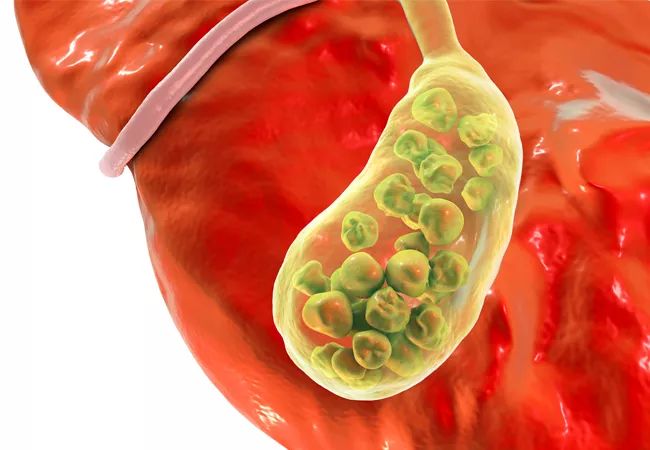Gallbladder Function

The gallbladder is a small but vital organ located beneath the liver, responsible for storing and concentrating bile. Although it’s relatively small in size, its role in digestion, especially in the digestion of fats, is essential. Understanding the function of the gallbladder helps in recognizing the importance of its health and why problems like gallstones or gallbladder polyps can have a significant impact on digestion and overall health.
What is the Gallbladder?
The gallbladder is a pear-shaped, hollow organ that lies under the right side of the liver. It plays a crucial role in digestion by storing bile, a digestive fluid produced by the liver. Bile is necessary for breaking down fats in the small intestine during digestion. After the liver produces bile, it is transported to the gallbladder, where it is stored until it’s needed.
Primary Functions of the Gallbladder
- Storage of Bile: The liver continuously produces bile, which is stored in the gallbladder until needed for digestion. Without the gallbladder, the body would not be able to store bile effectively and would have to release it directly from the liver into the intestine, which can be inefficient.
- Concentration of Bile: While the bile is stored in the gallbladder, the organ also concentrates it by absorbing water and electrolytes. This makes the bile more potent and effective when it’s needed for digestion.
- Release of Bile During Digestion: When you eat, especially fatty foods, the gallbladder contracts and releases concentrated bile into the small intestine through the bile ducts. This bile helps to emulsify fat, breaking it down into smaller particles that can be digested and absorbed by the body.
- Fat Digestion: The primary role of bile is to aid in the digestion and absorption of fats. Without an efficient supply of bile, the body cannot digest fats properly, which can lead to discomfort, malnutrition, and difficulty absorbing fat-soluble vitamins (A, D, E, K).
How Does the Gallbladder Work?
- Bile Production and Storage: The liver continuously produces bile, which is transported through the bile ducts to the gallbladder. Once stored, the bile waits for the signal to be released when food enters the stomach.
- Triggering Bile Release: When you eat, especially foods high in fat, your digestive system triggers the release of a hormone called cholecystokinin (CCK). This hormone causes the gallbladder to contract, pushing bile into the small intestine where it helps break down the fats.
- Absorption of Nutrients: After bile is released into the small intestine, it mixes with food to break down fats and aids in the absorption of essential nutrients, such as fatty acids and fat-soluble vitamins.
What Happens When the Gallbladder Malfunctions?
Several conditions can impact the proper function of the gallbladder, leading to discomfort or more severe complications:
- Gallstones: Hard deposits that form in the gallbladder and can block bile flow. Gallstones can cause pain, infection, and digestive issues.
- Gallbladder Inflammation (Cholecystitis): An inflammation of the gallbladder, usually caused by an infection or blocked bile ducts, leading to pain and digestive problems.
- Gallbladder Polyps: Non-cancerous growths in the gallbladder that may obstruct bile flow or cause symptoms like pain and nausea.
- Bile Duct Obstruction: A blockage in the bile ducts, often caused by gallstones, which can impair bile release and disrupt digestion.
Gallbladder Removal (Cholecystectomy)
If the gallbladder is severely damaged or causing complications, it may need to be removed through a procedure called cholecystectomy. This is often done using laparoscopic surgery, a minimally invasive method that involves small incisions and faster recovery.
After gallbladder removal, bile is still produced by the liver, but it flows directly into the small intestine. While the body can adapt to the loss of the gallbladder, some individuals may experience digestive changes, especially with high-fat meals.
Why Choose Dr. Ankur Bhanushali for Gallbladder Treatment?
Dr. Ankur Bhanushali is a highly experienced laser and laparoscopic surgeon specializing in gallbladder-related issues, including gallstones, gallbladder inflammation, and the removal of gallbladder polyps. He utilizes advanced techniques for diagnosis and treatment to ensure the best possible outcomes for his patients.
Visit Dr. Ankur Bhanushali for Gallbladder Treatment
If you’re experiencing discomfort, pain, or digestive issues related to the gallbladder, it’s essential to seek professional help. Dr. Ankur Bhanushali offers the latest treatments, including laparoscopic surgery, to address gallbladder problems and improve your quality of life.
📍 Visit Dr. Ankur Bhanushali – Laser & Laparoscopic Surgeon
1st Floor, Aayush Multispecialty Hospital, Marigold Apartment, Almeda Road, Panch Pakhdi, Thane West – 400602
🌐 Website: https://www.drankurbhanushali.com
📍 Google Maps: https://maps.app.goo.gl/3Msc7YZqVkV9mQMQ7
📧 Email: dr.ankur.bhanushali@gmail.com
🔗 Facebook: https://www.facebook.com/profile.php?id=61573840205822
🔗 Instagram: https://www.instagram.com/surgeon_dr_ankur_bhanushali
🔗 LinkedIn: https://www.linkedin.com/in/dr-ankur-bhanushali-b85aab2a6/
If you are dealing with gallbladder issues, don’t wait. Schedule a consultation with Dr. Ankur Bhanushali to discuss treatment options and ensure the best care for your gallbladder health.
